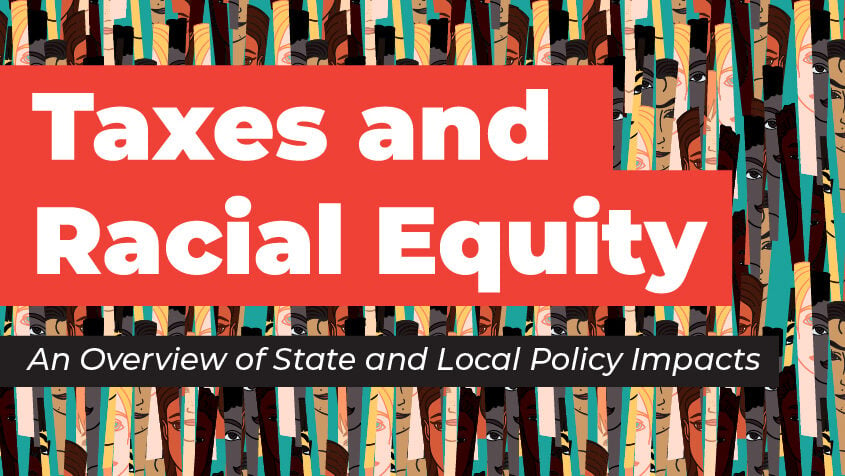This week the showdown between the Kansas legislature and governor continued as Gov. Kelly vetoed the legislature’s latest attempt to pass a flat personal income tax. Elsewhere, the focus is on doing more for working families through proposals to expand refundable credits in Maryland and adding a millionaire tax bracket in Rhode Island. Meanwhile, there’s no worse way to celebrate Black History Month than the special deals for big corporations under discussion throughout the South. For a better perspective, look to a progressive tax code that benefits all working families, and narrows rather than widens the racial income gap.
Major State Tax Proposals and Developments
- Gov. Laura Kelly of KANSAS vetoed the legislature’s most recent attempt to enact a flat personal income tax. In addition to collapsing the state’s progressive tax brackets to create a 5.25 percent flat tax, the bill proposed eliminating income taxes on Social Security income, indexing the standard deduction and personal exemption to inflation, immediately eliminating the grocery sales tax that is phasing out, and increasing the homestead exemption. – NEVA BUTKUS
- HAWAII Gov. Josh Green introduced tax legislation that includes inflation adjustments for the state’s standard deductions, tax brackets, and personal exemptions, and increasing the percentage of expenses covered by the Child and Dependent Care Tax Credit among other things. – MILES TRINIDAD
- MARYLAND lawmakers are introducing legislation to make the state’s tax system more progressive by expanding the Earned Income Tax Credit and the Child Tax Credit and generating an estimated $1.6 billion in additional revenue. Provisions in the proposal include a 7 percent tax increase on households earning over $1 million, reversing a 2014 estate tax exemption, and creating a 1 percent surcharge on capital gains. – MILES TRINIDAD
- Two dozen RHODE ISLAND legislators backed a new income tax bracket on millionaires in a proposal unveiled this week. Funds from the three percent tax on income earned above the million-dollar mark would be dedicated to schools, childcare, and transportation. – ANDREW BOARDMAN
Governors’ Annual Addresses and State of State Speeches
- Gov. Henry McMaster of SOUTH CAROLINA highlighted the tax cut passed by their legislature in 2022 which brought the top income tax rate from 7 to 6.5 percent, and expressed interest in speeding up the remaining phase-down to 6 percent if future revenues make it possible.
- WISCONSIN Gov. Tony Evers centered issues of reproductive health, affordable housing, childcare, and redistricting in his address to the state. But the governor’s speech was notably silent on the most recent Republican-backed tax cut plan that would cost the state $2 billion annually, with nearly 60 percent of the tax cut flowing to the state’s wealthiest 20 percent of residents.
State Roundup
- GEORGIA House Speaker Jon Burns introduced legislation to increase the state’s dependent exemption from $3,000 to $4,000 per qualified dependent, which would result in a $55 savings per dependent.
- Newly elected LOUISIANA Gov. Jeff Landry released his transition committee on economic development and fiscal policy’s tax recommendations, which include phasing out the state’s personal and corporate income taxes, corporate franchise taxes, reducing severance taxes on oil and gas, and eliminating the inventory tax and inventory tax credit.
- The Baltimore City Council adopted a resolution to request that the MARYLAND General Assembly pass a measure allowing city leaders to set a special tax rate for vacant and abandoned properties.
- MISSISSIPPI Gov. Tate Reeves called a brief special session to finalize a tax incentive package for Amazon Web Services to build two data-center complexes in Madison County, the wealthiest county in Mississippi. During the session, the legislature passed bills that would provide a 10-year, 100 percent corporate income tax exemption, sales and use tax exemptions, a 30-year rolling tax exemption if certain job targets are met, among other incentives.
- MISSOURI lawmakers are considering several tax measures affecting localities. First, a variety of proposals to limit the earnings tax in St. Louis, including by exempting remote workers, or certain counties. And second, a tax credit aimed at encouraging private conversions of empty office buildings into residential units.
- Two components of plans by NEBRASKA Gov. Jim Pillen and allies to reduce property taxes have met stiff opposition. The local officials educating children and providing other local services under proposed “hard caps” decried the “freeze” and pointed out that spending restraints enacted just last year are still phasing in. And Gov. Pillen’s plan to drain special-use funds of revenues built up from things like hunting license fees and unemployment insurance contributions was widely panned. Next up: a hearing today on ending sales tax exemptions and another next week on raising the sales tax rate, both of which are likely to encounter even more criticism.
- Also in NEBRASKA, a lawmaker is proposing a nonrefundable income tax credit to defray the cost of caring for older adults.
- As TENNESSEE tax debates continue, the Tennessee Lookout breaks down Gov. Lee’s proposal to address a potential legal challenge with a massive tax corporate break. Instead of a billion-dollar windfall in retroactive tax breaks for the state’s largest corporations, tax law expert Peter Enrich suggests a simple and affordable credit.
- The VIRGINIA Senate passed a measure that will allow localities to levy an additional one percent local sales tax to fund the construction or renovation of schools, if approved by voters.
What We’re Reading
- As Black History Month kicks off, it’s helpful to return to past policy research on how taxes are not race-neutral. Simply measuring the income and wealth gaps faced by Black Americans misses how the tax code helped build and still sustains gaps in prosperity. But, race-conscious discourse is improving tax policy conversations on how state and local taxes intersect with race and ethnicity.
- For a full account of the history—including county level data and their modern implications—of how taxes built and sustained the slave power, Dray, Landais, and Stantcheva provide an excellent accounting of the accumulation of stolen lives and the taxes paid in the antebellum South.
- In the modern era, states can pursue more antiracist tax codes, and specific income tax policies can further that mission.
If you like what you are seeing in the Rundown (or even if you don’t) please send any feedback or tips for future posts to Aidan Davis at [email protected]. Click here to sign up to receive the Rundown via email.





